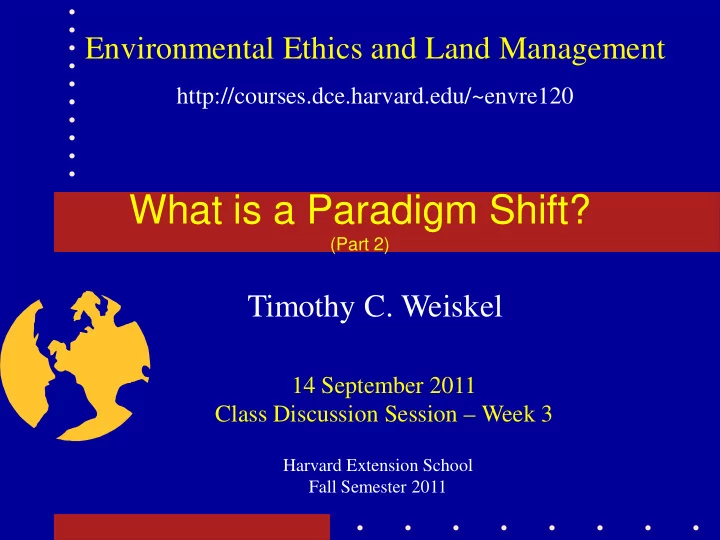

Environmental Ethics and Land Management http://courses.dce.harvard.edu/~envre120 What is a Paradigm Shift? (Part 2) Timothy C. Weiskel 14 September 2011 Class Discussion Session – Week 3 Harvard Extension School Fall Semester 2011
A paradigm shift is a change in outlook or worldview. It is, effectively, a total change in perspective. In any field of science a paradigm shift represents a radical transformation of the framework within which individual empirical observations and broader theoretical assertions are interpreted and understood. Tim Weiskel - 2
Three Examples of Paradigm Shift 1. Galileo and the shift from a Terracentric to a Heliocentric World. 2. Plate Tectonics and the move from “Acts of God” to Earth System Dynamics. 3. From the Growth Paradigm to the Sustainability Paradigm in World Agriculture – Beyond the “Green” Revolution. Tim Weiskel - 3
The Insight of Thomas Kuhn… This is the 50 th anniversary of the publication of Thomas Kuhn’s important work.… Its insights are crucial for understanding the history of modern science… Celebrations are planned for 2012. Tim Weiskel - 4
Case 1 Galileo’s “Blasphemy” Galileo and the shift from a Terracentric to a Heliocentric World. Tim Weiskel - 5
Europeans and Chinese had long mapped the striking “evidence” of the morphological relatedness of continents. Tim Weiskel - 6
Case 2 The Plate Tectonic Paradigm Shift Tim Weiskel - 7
Alfred Wegener with his theory of “continental drift” and the subsequent development of “Plate Tectonics” allowed humans to move from observing “Acts of God” to exam instead “earth system dynamics.” Tim Weiskel - 8
Tim Weiskel - 9
Case 3 From the Growth Paradigm to the Sustainability Paradigm Tim Weiskel - 10
http://www.climate-talks.net/2008- Tim Weiskel - 11 ENVRE130/Audio/20090913-NPR-Borlaug-dies.htm
BBC, Newshour, 3 September 2009 http://www.climate-talks.net/2008- ENVRE130/Audio/20090913-BBC- Borlaug-Newshour-obit.mp3 Tim Weiskel - 12
http://www.climate-talks.net/2008-ENVRE130/Video/20090913-YouTube- Borlaug-Promoter.htm Tim Weiskel - 13
http://ecojustice.net/2006-ENVRE120/Video/20050330-BBC-Millenium- Ecosystem-Study-Index-l.htm No amount of genetic engineering will address the ethical problem of limit posed by the most recent scientific studies. Tim Weiskel - 15
But our basic problem is that… we’ve ‘forgotten’ (and it may be that many of our leaders never knew) the basic ecological insight about our collective “niche” as a species in the global ecosystem. Tim Weiskel - 16
Never before….and never again.
Culturally, we need to move from sectoral thinking to systems thinking. We need to keep clearly in mind more than just one problem and specifically how different problems amplify and interact with each other. Further, we need to understand that growth is inherently destabilizing.
Tim Weiskel - 20
Tim Weiskel - 21
Case 1 Galileo’s “Blasphemy” Galileo and the shift from a Terracentric to a Heliocentric World. Tim Weiskel - 22
Case 2 The Plate Tectonic Paradigm Shift Tim Weiskel - 23
Case 3 From the Growth Paradigm to the Sustainability Paradigm Tim Weiskel - 24
Three Examples of Paradigm Shift 1. Galileo and the shift from a Terracentric to a Heliocentric World – Cosmic science. 2. Plate Tectonics and the shift from “Acts of God” to Earth System Science. 3. The shift from the Growth Paradigm to the Sustainability Paradigm: Beyond the “Green” Revolution in Global Agriculture. Tim Weiskel - 25
Three Examples of Paradigm Shift 1. Galileo and the shift from a Terracentric to a Heliocentric World – Cosmic science. [Now universally accepted.] 2. Plate Tectonics and the shift from “Acts of God” to Earth System Science. [Publicly accepted . Still contested in pre-scientific circles…] 3. The shift from the Growth Paradigm to the Sustainability Paradigm: Beyond the “Green” Revolution in Global Agriculture. [ Widely accepted in scientific circles; still contested by engineers, economists and politicians]. Tim Weiskel - 26
Paradigms – or worldviews – have enormous implications for ethics and for policy… In the middle of the 20 th century – largely following the paradigm championed by Norman Borlaug – humanity transformed agriculture from solar based systems to a global petro- dependent one. If we are ethically responsible for the foreseeable consequences of our own behavior what will this mean for the ethics of agriculture?
What about the larger “ethics of growth?” Tim Weiskel - 28
Where do you stand in the midst of these paradigm shifts? You need to pay attention to how your mind and heart are being “furnished.” If you don’t someone else will furnish them for you. (Billions are spent each year in this effort). Higher education is your last best chance….That’s what it is for. It can prepare you for the paradigm shifts that you will have to undertake in your own life… Tim Weiskel - 29
Environmental Ethics and Land Management http://courses.dce.harvard.edu/~envre120 What is a Paradigm Shift? (Part 2) Timothy C. Weiskel 14 September 2011 Class Discussion Session – Week 3 Harvard Extension School Fall Semester 2011
Recommend
More recommend